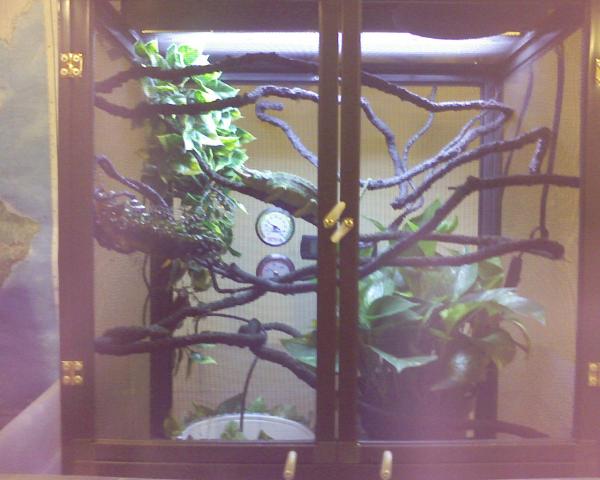LSepkowski
New Member
Hello, my name is Lori. I came across your forums today and I was wondering if I could pick your guys brains about a few things. I just became the owner of a Jackson's chameleon and I was hoping that you all might be able to help me out with a few things.
I've had my Jackson's chameleon for 2 weeks now. He was captive bred (I brought him from a breeder) and is 5 in. from snout to his butt. I don't know how old he is (the breeder told me, but I forgot in my excitement) but maybe his size will give an approximate. He eats anywhere from 4-6 adult gut-loaded crickets a day. The terrarium he's in right now is 18x20x22 all screen enclosure. For the heat source I have a 50 watt basking lamp on one side of the cage and I use a 40 watt infrared at night (my room is generally hot, so the temp is around 75-78 during the day and 68-70 at night) I have water from a dripper constantly on and I use my misting machine 3-4 times a day. I have one fake hanging plant from the side and one pothos plant on the ground.
I've done a lot of research on the web about proper care of a Jackson's chameleon, but the problem is that some information contradicts itself or is unclear. So if I could just give an overview of how I'm caring for my chameleon then maybe you can steer me in the right direction if I'm doing anything wrong.
1. The lighting I'm using is from PetCo. It's called the Repti Glow "Tropical Terrarium Lamp 5.0 UVB," which emits 30% UVA and 5% UVB. Is this adequate lighting, or is there a better brand or ratio of UVA/UVB lighting?
2. I've been giving him gut-loaded crickets that have been fed with dandelion, collard greens, and endive. I read a lot of blogs and articles suggesting that things like lettuce, spinach, and carrots are no good for them, while other sites say their perfectly fine. I want to make sure that he is getting the right amount of nutrients to stay healthy, so if there is anything that I should be feed him would you let me know. Also I know I should be feeding him other insects, but which ones would you guys recommend?
3. I have been dusting the crickets with calcium and a multi, but it is unclear how often I should be doing this. Some people are saying every day, some say once a week. It's just confusing.
Thank you all so much in advanced for helping me out. I've been really stressing out about my chameleon. I'm totally in love with the little guy and I want to make sure I can give him a long and healthy life. If you need any more information just get back to me with your questions. I'm down for any constructive criticism, but no one need to be nasty. After all, I'm asking for your help so I can be a better pet owner. Thanks again!
-Lori
I've had my Jackson's chameleon for 2 weeks now. He was captive bred (I brought him from a breeder) and is 5 in. from snout to his butt. I don't know how old he is (the breeder told me, but I forgot in my excitement) but maybe his size will give an approximate. He eats anywhere from 4-6 adult gut-loaded crickets a day. The terrarium he's in right now is 18x20x22 all screen enclosure. For the heat source I have a 50 watt basking lamp on one side of the cage and I use a 40 watt infrared at night (my room is generally hot, so the temp is around 75-78 during the day and 68-70 at night) I have water from a dripper constantly on and I use my misting machine 3-4 times a day. I have one fake hanging plant from the side and one pothos plant on the ground.
I've done a lot of research on the web about proper care of a Jackson's chameleon, but the problem is that some information contradicts itself or is unclear. So if I could just give an overview of how I'm caring for my chameleon then maybe you can steer me in the right direction if I'm doing anything wrong.
1. The lighting I'm using is from PetCo. It's called the Repti Glow "Tropical Terrarium Lamp 5.0 UVB," which emits 30% UVA and 5% UVB. Is this adequate lighting, or is there a better brand or ratio of UVA/UVB lighting?
2. I've been giving him gut-loaded crickets that have been fed with dandelion, collard greens, and endive. I read a lot of blogs and articles suggesting that things like lettuce, spinach, and carrots are no good for them, while other sites say their perfectly fine. I want to make sure that he is getting the right amount of nutrients to stay healthy, so if there is anything that I should be feed him would you let me know. Also I know I should be feeding him other insects, but which ones would you guys recommend?
3. I have been dusting the crickets with calcium and a multi, but it is unclear how often I should be doing this. Some people are saying every day, some say once a week. It's just confusing.
Thank you all so much in advanced for helping me out. I've been really stressing out about my chameleon. I'm totally in love with the little guy and I want to make sure I can give him a long and healthy life. If you need any more information just get back to me with your questions. I'm down for any constructive criticism, but no one need to be nasty. After all, I'm asking for your help so I can be a better pet owner. Thanks again!
-Lori








